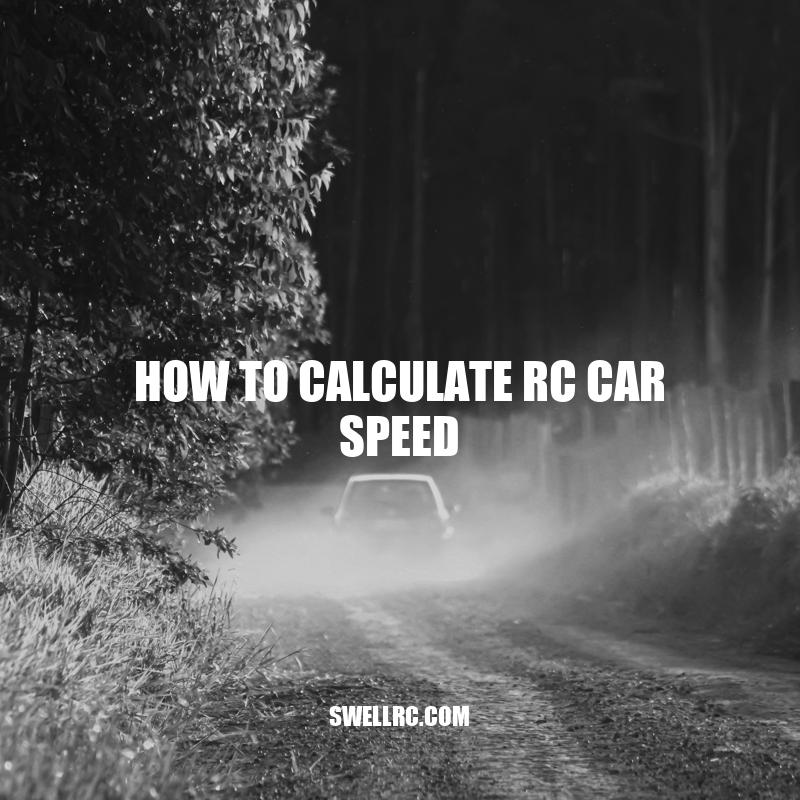How to Calculate RC Car Speed: A Comprehensive Guide
Remote control (RC) cars are a fun and exciting hobby that has captivated enthusiasts of all ages. These miniature cars can be driven on different terrains, from smooth pavements to rugged off-road tracks, and are designed to mimic the performance of real-life automobiles. In the world of RC cars, knowing the speed of your vehicle is important for several reasons. Firstly, it helps you gauge the performance of your car and identify potential areas for improvement. Secondly, it allows you to participate in RC car races and other events where speed is a crucial factor. Lastly, it simply adds to the overall fun and excitement of driving an RC car. In this article, we will explore the different factors that affect an RC car’s speed, and provide insights on how to calculate and optimize it.
Understanding RC Car Speed
To understand RC car speed better, you need to know the different types of measurement units used to denote speed. Some common units of measurements include kilometers per hour (km/h), miles per hour (mph), and feet per second (fps). Here is a brief summary of what they mean:
- Kilometers per hour (km/h): This is the standard speed measurement unit used in most parts of the world, except the US.
- Miles per hour (mph): This is the standard speed measurement unit used in the US.
- Feet per second (fps): This is the speed measurement unit used in scientific and engineering applications.
RC car speed can be affected by several factors, including battery power, motor quality, gear ratio, tire grip, weight, and aerodynamics. Each of these factors plays a crucial role in determining how fast your RC car can go. In the next section, we will discuss these factors in more detail and provide tips on how to optimize them.
If you are interested in purchasing an RC car speedometer or radar gun to measure your RC car’s speed, there are different websites and products available in the market. However, it’s important to do proper research and read reviews before making a purchase to ensure that you get a reliable and accurate device.
How fast should a RC car go?
RC cars come in various speed ranges, and choosing the right speed depends on your experience level and intended use. Here are some general speed guidelines to consider:
- Toy-grade RC cars typically have a top speed of 5-15 mph and are best for beginners and indoor use.
- Hobby-grade RC cars can reach speeds of 20-50 mph or more and are suitable for intermediate to advanced users who want to race or complete more challenging courses.
- Competition-level RC cars can hit speeds of 70+ mph and are designed for serious racers who compete in professional events.
It’s important to note that higher speed usually means higher cost, so consider your budget when choosing a RC car. Additionally, always follow safety guidelines and never operate RC cars in public areas or around people or pets.
If you’re interested in purchasing an RC car, research different models and brands before making a decision. Websites such as Horizon Hobby, Tower Hobbies, and AMain Hobbies offer a wide range of RC cars and accessories for all experience levels.
Factors Affecting RC Car Speed
There are several factors that influence how fast your RC car can go. Here are some of them:
Battery Power
| Battery Type | Performance |
|---|---|
| NiMH (Nickel-Metal Hydride) | Average performance, affordable and easy to use |
| LiPo (Lithium Polymer) | Higher performance, lighter weight, and more expensive; requires caution when handling and charging |
| LiFe (Lithium-Ion Phosphate) | Similar to LiPo but with longer lifespan and safer to use |
Motor Quality
– Higher quality motors can provide better performance and speed.
– Look for motors with a high number of turns and low resistance.
Gear Ratio
– Choosing the right gear ratio can greatly improve speed and acceleration.
– Lower gear ratios provide more speed, while higher gear ratios provide more torque.
Tire Grip
– Tires with better grip provide better traction and speed.
– Harder tires are better suited for flat surfaces while softer tires are better suited for off-road driving.
Weight
– A lighter RC car will have better speed and acceleration.
– Remove any unnecessary weight, such as heavy batteries, to improve speed.
Aerodynamics
– A well-designed RC car body can reduce drag and increase speed.
– Look for low profile and streamlined body designs for better performance.
Some websites such as Amazon and RC Planet offer a wide range of RC car parts and accessories that can help you improve your car’s speed and power. It’s important to do your research and choose high-quality products from reputable brands to ensure optimal performance.
What factors affect the speed of a car?
- Engine power and torque
- The car’s weight and aerodynamics
- Gearing ratios and transmission
- Tire size and pressure
- The slope and surface of the road
- Weather conditions (wind, rain, snow)
- Altitude and air density
If you are interested in learning more about cars and their speed, you may visit car manufacturer websites or online automobile magazines such as Car and Driver, Motor Trend, or Road & Track. Additionally, there are various performance tuning products and services available for optimizing your car’s speed.
Calculating RC Car Speed
To calculate the speed of an RC car, you can use either a GPS speedometer or a radar gun. Here’s how to use them:
GPS Speedometer
– Purchase a GPS speedometer device from a reputable brand such as SkyRC or Racers Edge.
– Attach the device to your RC car according to the manufacturer’s instructions.
– Set the device to measure speed in your preferred measurement unit (mph, km/h, fps).
– Drive your RC car in a straight line for an accurate reading.
– Make sure to take several readings and average them out to get a more precise result.
Radar Gun
– Purchase a radar gun suitable for measuring RC car speeds, such as Stalker Sport 2 or Pocket Radar PR1000.
– Set up the radar gun on a flat and clear surface.
– Align the radar gun’s beam with your RC car’s path.
– Drive the car towards the radar gun to get a speed reading in your preferred measurement unit.
– Make sure to take several readings and average them out to get a more precise result.
Some online resources such as RC Geeks and RC Driver offer detailed guides on how to use GPS speedometers and radar guns to measure RC car speed. You can also find helpful videos on YouTube from RC car enthusiasts who demonstrate the process of using these devices.
How fast is my RC car?
Determining the speed of an RC car can be a bit tricky, as it can vary depending on multiple factors. However, here are some general guidelines:
- Toy-grade RC cars typically have a speed of around 5-15 mph (8-24 km/h).
- Hobby-grade RC cars can have speeds ranging from 20-70 mph (32-113 km/h) or even more.
- The speed of your RC car can also depend on the terrain it’s being driven on, as well as variables such as battery life and motor power.
If you’re interested in purchasing a high-speed RC car, websites like Traxxas and Horizon Hobby offer a wide range of options to choose from.
Tips and Strategies for Increasing RC Car Speed
There are several ways to optimize your RC car’s performance and increase its speed:
Proper Maintenance
– Regularly clean and lubricate your RC car’s moving parts to reduce friction and improve its overall efficiency.
– Keep the tires properly inflated and aligned to minimize drag and improve traction.
Upgrading Parts
– Upgrade to a higher-quality battery pack to provide more power to your RC car’s motor.
– Replace your RC car’s brushed motor with a brushless motor to increase its speed and torque.
– Install a higher-revving motor to boost your RC car’s acceleration.
Optimizing Weight and Aerodynamics
– Reduce your RC car’s weight by removing any unnecessary parts or components.
– Replace heavier parts with lightweight alternatives, such as a carbon fiber chassis or aluminum drive shafts.
– Modify your RC car’s body to improve its aerodynamics, such as adding a rear spoiler or front splitter.
Online RC communities such as RC Universe and RC Groups offer helpful tips and advice on how to optimize your RC car for speed. Additionally, online hobby shops such as AMain Hobbies and Tower Hobbies offer a wide range of aftermarket parts and upgrades for RC cars.
How can I increase my RC car speed?
- Upgrade to a higher voltage battery
- Replace the stock motor with a high-performance motor
- Install a lightweight body
- Reduce friction by using bearings instead of bushings
There are many websites and products that offer RC car upgrades and parts for increasing speed. Some popular options include HobbyKing, Team Associated, and Traxxas.
Conclusion
If you’re interested in optimizing your RC car’s performance and breaking speed records, start by accurately measuring its speed using the techniques outlined in this article. From there, experiment with different parts, upgrades, and modifications to improve your RC car’s speed and performance. Remember to always prioritize safety when working with RC cars, and have fun!
Several online resources are available for RC car enthusiasts looking to learn more about the hobby and optimize their cars for speed:
Online Communities
– RC Universe: A forum-based community with discussions on RC car racing, building, and modifications.
– RC Groups: A community with a vast library of articles, tutorials, and discussions on all aspects of the RC hobby.
Hobby Shops
– AMain Hobbies: A large online hobby store with a wide selection of RC car parts and upgrades.
– Tower Hobbies: Another popular online hobby store with a variety of RC car products and accessories.
By utilizing these resources and putting in some time and effort, you can transform your RC car into a high-performance speed machine that will leave your competition in the dust.
How can I get more speed out of my RC car?
Here are a few things you can do to increase the speed of your RC car:
- Upgrade your motor and gearing
- Reduce the weight of the car
- Use high-performance batteries
- Replace the tires with low-resistance ones
- Adjust the suspension and steering for optimal performance
If you are looking for specific products to help you achieve more speed, check out websites such as Horizon Hobby, HobbyKing, and Tower Hobbies for a wide range of options.
Conclusion
Measuring an RC car’s speed can be a fun and rewarding experience for those passionate about the hobby. By understanding the factors that affect speed and learning the proper techniques for measuring it, RC car enthusiasts can optimize their cars for maximum performance and enjoy the thrill of high-speed racing. Whether you’re a beginner or an experienced RC car racer, taking the time to learn how to calculate an RC car’s speed can enhance your understanding and appreciation of the hobby.
By following the steps outlined in this article and utilizing the recommended online resources, you can become an expert at measuring and optimizing your RC car’s speed. Remember to always prioritize safety when working with RC cars and to have fun while pushing your car to its limits. With the right knowledge and techniques, you can take your RC car from a simple toy to a high-performance speed machine capable of racing and winning against the best in the field.



